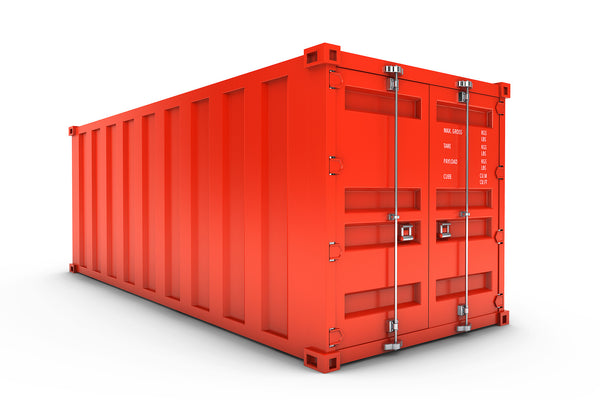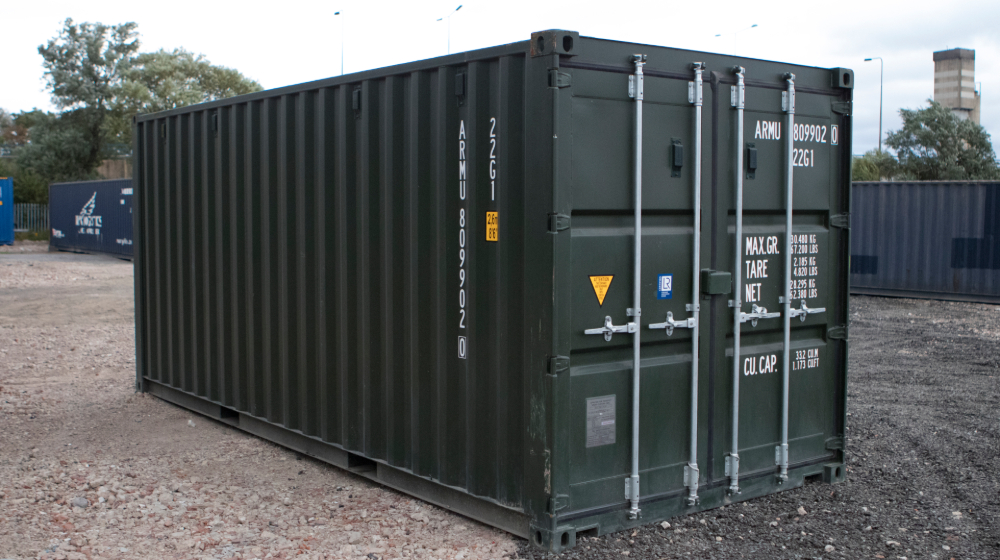How to Rent New Shipping Container 40 x 8 x 9.6 and Reduce Your Environmental Footprint
How to Rent New Shipping Container 40 x 8 x 9.6 and Reduce Your Environmental Footprint
Blog Article
The Ultimate Overview to Selecting the Right Shipping Container for Your Requirements
When it pertains to picking the appropriate delivery container, recognizing your specific requirements is crucial. You'll intend to consider aspects like dimension, type, and material to assure you make the most effective selection. From basic sizes to specialized choices, there's a great deal to discover. Plus, budgeting for both the container and any kind of adjustments can make a big difference. Let's damage down the key aspects to aid you find the best suitable for your demands.
Recognizing Shipping Container Sizes
When you're selecting a shipping container, understanding the numerous dimensions readily available is essential for making the ideal choice. Shipping containers typically are available in typical sizes of 20 and 40 feet, however you'll also locate various other dimensions. Understanding the size you need depends on what you plan to store or transport.If you're relocating smaller sized things, a 20-foot container could be suitable, while bigger shipments typically call for a 40-foot container. The height can also vary; high dice containers use additional upright area, which can be advantageous for taller goods.Before making a decision, gauge your freight, and think about just how much area you'll require for filling and unloading. Constantly consider possible future demands-- choosing for a somewhat bigger container might conserve you headache down the line. Ultimately, picking the right size will enhance performance and assure your things are safe and secure throughout transportation
Sorts Of Delivery Containers Available
There are numerous kinds of delivery containers offered, each developed for specific functions and cargo requirements. The conventional dry container is flexible, excellent for basic freight. If you're delivering perishable goods, consider a cooled container, which keeps a controlled temperature. For extra-large things, high cube containers use extra height, fitting taller loads.If you require to move heavy machinery or equipment, flat rack containers offer a strong base without wall surfaces. Meanwhile, open-top containers permit very easy loading of high freight, with a detachable tarp covering for defense. If you're trying to find adaptability, take into consideration a retractable container that can be conveniently kept when not in use.Lastly, specialized containers like container containers are utilized for liquids, while vented containers are designed for bulk freight that needs air flow. Knowing your cargo type will aid you select the appropriate container to meet your delivery needs effectively.
Product Factors To Consider for Longevity
When picking a delivery container, the material plays an important role in its longevity. You'll wish to weigh the advantages of steel versus light weight aluminum, particularly concerning deterioration resistance. Recognizing these aspects can aid you make a much more informed choice for your shipping needs.
Steel vs. Light weight aluminum Containers
Exactly how do you pick in between steel and light weight aluminum containers for your delivery needs? Start by thinking about resilience. Steel containers are robust and offer excellent toughness, making them suitable for heavy tons and rough conditions. They stand up to damages from influences and are commonly more economical, which can be a significant aspect for budget-conscious buyers.On the other hand, light weight aluminum containers are lightweight, which can conserve you on delivery expenses. They're less complicated to maneuver and are a fantastic choice if you need to deliver goods regularly. Nonetheless, aluminum is normally extra expensive and much less robust than steel. Evaluate your specific needs meticulously, including weight, cost, and the kind of cargo you'll be shipping, to make the ideal option for your situation.
Deterioration Resistance Variables
Choosing the ideal material doesn't simply entail weight and expense; rust resistance plays a substantial role in durability. When picking a shipping container, take into consideration the environment it'll face. Steel containers, while strong, can rust otherwise correctly dealt with. Seek choices with protective finishings or galvanization to improve their life-span. Aluminum, on the other hand, provides all-natural rust resistance, making it optimal for coastal locations or moist conditions. However, it can be much more costly. In addition, analyze the container's use-- if it'll be revealed to chemicals or severe climate, prioritize products that can stand up to these conditions. Purchasing a corrosion-resistant container now can conserve you from expensive repair work or replacements down the line. Choose intelligently for lasting advantages.
Alterations and Modification Options
Shipping containers aren't just for transferring products; they can be transformed to fulfill your particular demands through numerous alterations and personalization choices. You can convert a basic container into a cozy workplace room, a temporary retail shop, or even a personal health club. The you could try here opportunities are almost endless.Think about including windows, insulation, or air flow to improve comfort. You could likewise take into consideration electrical circuitry, pipes, or perhaps custom shelving to enhance capability. If protection's a problem, reinforced locks can provide tranquility of mind.For aesthetic appeal, you can repaint the container or add an unique layout to make it stand apart. Do not forget floor covering options-- whether you desire sturdy plywood or something a lot more advanced, it can raise the space.Ultimately, tailoring your delivery container to suit your requirements can enhance functionality and develop a distinct setting that reflects your design.
Evaluating Your Transportation Requirements
When it comes to using your changed delivery container, comprehending your transport needs is crucial. Beginning by establishing what you'll be shipping-- whether it's hefty equipment, retail products, or individual items. Each sort of cargo has various requirements pertaining to size, weight, and accessibility.Next, consider the range and mode of transport. Are you shipping locally, nationally, or globally? This affects the container's design and performance. If you're utilizing vehicles, ensure your container fits common measurements for very easy loading and unloading.Additionally, think of transit problems. Will your things require special security from weather or temperature level fluctuations? If so, you might need insulation or ventilation functions in your container.Lastly, analyze how commonly you'll be transporting goods. Regular shipments may require a more sturdy and flexible container to fulfill continuous needs. By resolving these variables, you'll be well-prepared to choose the best shipping container for your requirements.
Budgeting for Your Shipping Container
Setting an allocate your shipping container is crucial for ensuring a smooth buying process. Figure out exactly how much you can pay for to spend. Rates can differ significantly based on dimension, problem, and type. New containers normally cost much more, but utilized ones can use considerable savings.Next, take into consideration any type of extra prices you may incur, such as transportation charges, delivery fees, and alterations. If you intend to tailor the container, aspect in those expenses also. Research different suppliers to contrast costs and find the finest offer that fulfills your needs.Don' t fail to remember to include any type of authorizations or guidelines that might relate to your purchase and use of the container. By clearly outlining your budget plan, you'll be much better prepared to make informed choices, guaranteeing you obtain the right container without breaking the bank.
Upkeep and Look After Longevity
To ensure your shipping container lasts for years, regular upkeep is crucial. Start by evaluating the outside for corrosion, dents, and damage. If you identify any problems, address them instantly to stop further wear and tear. Tidy the container periodically, both throughout, to remove dust, debris, and wetness that can cause corrosion.Ensure the doors seal properly and oil the joints to prevent corrosion and sticking. If you're making use of the container for storage space, think about including ventilation to decrease moisture and mold and mildew growth. For extra defense, apply a rust-inhibiting paint or sealer annually.If your container's situated in a severe setting, like coastal locations, you may need to increase upkeep regularity. Watch on the flooring, as well; any kind click this link of indications of wear should be fixed today. With these simple steps, you'll prolong the life of your shipping container substantially.
Regularly Asked Questions
Exactly how Do I Locate a Dependable Delivery Container Supplier?
To locate a reputable delivery container provider, begin by researching online evaluations, requesting for referrals from friends or market calls, and contrasting prices. Constantly check their credentials and assurance they use quality containers that fulfill your requirements.

Can I Rental Fee a Shipping Container Rather Than Purchasing?
Yes, you can certainly lease a shipping container as opposed to acquiring one. Several distributors provide rental options, which can conserve you cash and give flexibility if you only require it for a brief duration.
What Allows Are Required for Container Placement?

Are Shipping Containers Weatherproof and Appropriate for Outdoor Storage Space?
Yes, delivering containers are usually weatherproof, designed to endure rough problems. Their robust construction maintains your things safe and completely dry, making them appropriate for outdoor storage. Just assure proper ventilation to avoid dampness build-up inside.
Exactly how Do I Deliver a Shipping Container When Bought?

Report this page